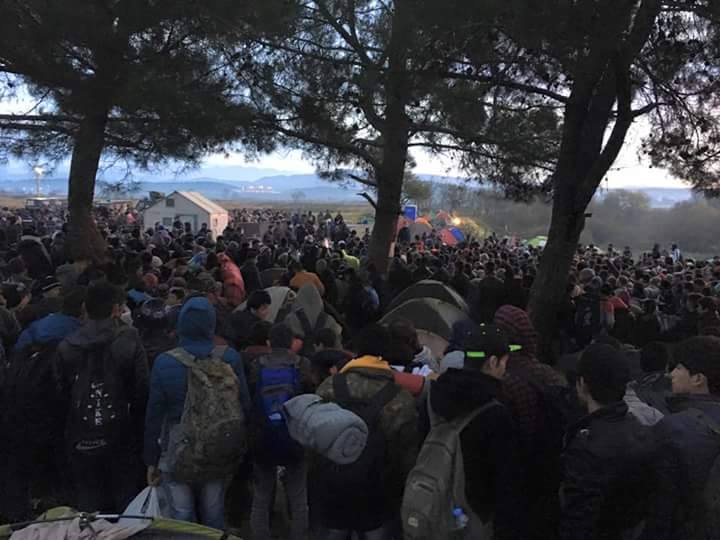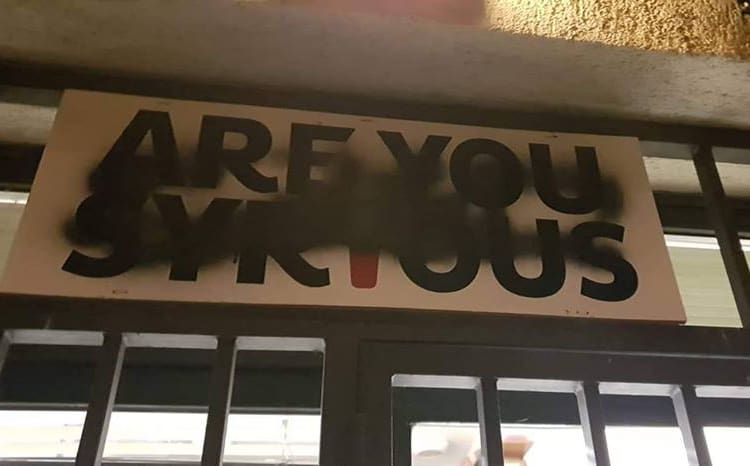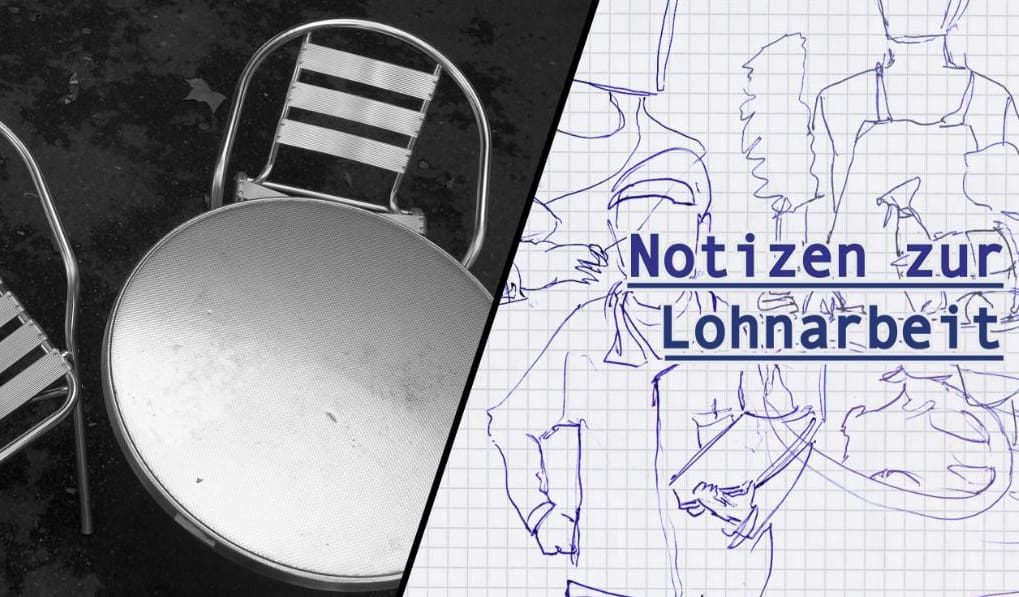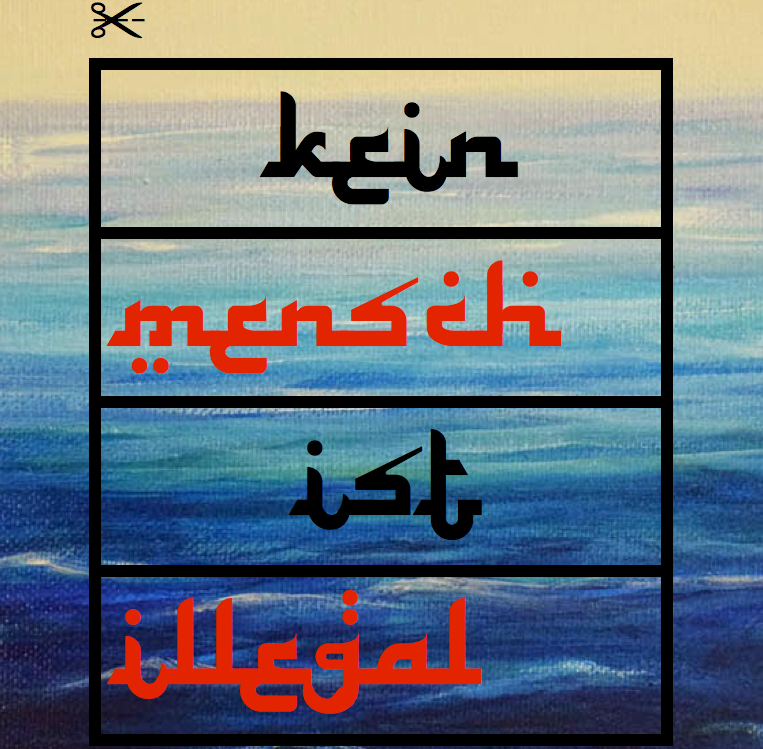Self-organized solidarity and mutual aid initiatives have for months been the only thing preventing complete breakdown and disaster along refugee routes through the Balkans. But the ad hoc nature of this activism has shown its limits, and now that bureaucracies (both state and non-) have started lurching into “action,” the effect has been to limit autonomous efforts even further, without replacing them with something better. Quite the contrary: with winter coming, border, customs and immigration officials in many countries are making it harder for refugees to find relief, or it to find them. The result could be the equivalent of another slow-motion massacre, another trail of corpses, this time frozen instead of drowned. But it doesn’t have to be.
Winter Is Upon Us
by Antidote’s Ed Sutton
23 November 2015
On Shifting Ground
Even though refugees dropped off the radar of most dominant media almost immediately after a surge in public compassion when photographs of a dead Syrian Kurdish child, washed up on a Turkish beach, circulated virally in September, they are once again the focus of international debate. This time, sadly, it is as an outgrowth of the aggressive passions raised by the Daesh attacks in Paris. As such, this latest round of discourse has centered primarily on admission and settlement policies in Western countries and on the broader historical resonance, often of a terrifying sort, that the issue has suddenly been acknowledged to have.
While both of these topics are crucial, focus has not entirely returned to refugees—that is, we are still not talking about actual refugees themselves, where they are, and what it’s like there. There was a little of this, also in early September, when flurries of images out of Budapest’s Keleti train station or the Serbian-Hungarian border town of Röszke briefly brought attention to conditions on the as-yet-untitled “Balkan Route” following the August deaths by asphyxiation of 71 refugees in a truck in Austria.
Still, beyond the ever-unspooling string of obtuse headlines about new fences and border restrictions put in place by this or that country, for the last couple of months what little information has come out of the region traversed by the route—stretching from Turkey through Bulgaria or oversea to Greece, Macedonia, Serbia, Hungary, Croatia, and Slovenia—has largely been thanks to the documentation efforts of activists and refugees on the ground there.
This phenomenon, of people’s autonomous and self-organized initiatives filling in where traditional institutions are absent or obstinate, is evident not only in the media sphere, of course, but in the aid and solidarity efforts themselves. Naturally, the people reporting to us from the Balkan Route are for the most part doing so only alongside their primary reason for being there: to offer aid, solidarity, and relief while governments and international organizations balk, buck, and squabble.
This is not to overemphasize the aid aspect with vapid “Look who’s opening their hearts” congratulations—this liberal habit tends to present the refugee as a helpless, clueless subject, and we need not look further than the dramatic footage of refugees crashing through barbed border fences (and, just this weekend, holding spirited demonstrations against border closures) to remind ourselves that they are capable enough as independent radical agents.
But it is also important that the self-organized aid initiatives of ordinary citizens across Europe be acknowledged, examined, lauded, and supported, so that they can coordinate and expand. Most of them, with us jogging to keep up, have been learning on the fly after starting essentially from scratch, and the curve has been steep. And it will be getting steeper.
So here is a brief lay of the land based on reports from groups that the Antidote Writers Collective has been in contact with—representing, obviously, only a tiny fraction of the entire inchoate effort. In late summer, in Switzerland and other Western European countries, much of civil society, your friendly neighborhood “ordinary citizens,” to their credit, seemed to have been overcome with grief and guilt over the death of Alan Kurdi. Many found themselves engaging, perhaps for the first time, in political and social solidarity efforts. Some started their own initiatives—from organizing demonstrations to arranging visits at refugee centers to collecting donations of money and supplies all the way to using their own cars to personally transport refugees safely across borders. Others found their way to (or were members of) organizations that were already engaging with the refugee issue, such as antifascist, antiracist and anticapitalist groups, who with a modest head-start were beginning to do many of the same things on a larger scale and with more explicit political underpinnings.
Among the first major attempts at coordinating these initiatives was a meeting of international activists in Ljubljana, Slovenia, in late September. Along with hundreds of people from a dozen (primarily Eastern European) countries, several Swiss comrades of the AWC attended—and some have not yet returned from the Balkan Route.
In the two months since the Open Borders Caravan meeting, group formations, priorities, strategies, and locations have been in a near-constant state of flux as conditions change and people move along the route: some places get crowded while others empty out; access to locations and availability of resources also changes unpredictably as states cast about in all the wrong directions looking for ways to discourage, slow or (most absurdly) stop the passage of people into and through their territories.
Much of October was characterized by trauma, desperation, and futility on the part of both refugees and activists on the Balkan Route, as the world’s attention drifted elsewhere, the nights started getting colder, and many states’ relative openness to letting people through was revealed to emphasize the “through”—that is, Keep Moving. Even when transport by bus or train was arranged temporarily over certain stretches of the route, people often went for days without a rest, a stop, a meal, a nap, let alone a night’s sleep. We could call it a forced march, except the people wanted to get to Germany, Sweden, a stable legal status, and safety just as badly as local border guards, police, and immigration officials along the route wanted them out: out of sight, out of mind, out of my country, out of my hands.

Through all of this, there was virtually no sign of established legacy aid organizations or recognized international NGOs, whose resources are already brutally stretched and are for the most part focused in places we are more used to associating with refugees: the “front line” countries of the Middle East and Africa, and around the Mediterranean coast.
Thankfully, things marginally improved on the Balkan Route over the early weeks of November. Some groups, now with a few weeks or months of experience, started to hit their stride. At the same time institutional bureaucracies also emerged out of their slumber, rubbing their eyes grumpily. Refugees on the schlep were more likely to encounter some basic services—albeit coupled with some much more than basic security—at their next day’s destination.
Currently, our sources are indicating that the situation in Slovenia and Croatia is fairly well in hand; they have even redirected arriving volunteers to under-served (and under-observed) locations further into the peninsula, especially in Serbia and Macedonia, where border and customs officials have made access difficult for both volunteers and supplies lacking registration with a recognized NGO. Meanwhile, Greece continues to be a story unto itself. At the very least, solidarity activists, local organizations, and NGOs there have slightly longer experience and appear to have no critical shortage of volunteers since the horrific wave of almost daily mass-drownings in recent weeks.
By no means is this to say we can dust off our hands and relax. Bodies washing ashore on Greek islands is still a regular occurrence. The increasing presence of recognized aid organizations has been accompanied by increasing customs controls and increasing institutionalization (i.e. the literal fencing-off) of the overland route, which simply hides refugees’ continuing misery while simultaneously obstructing its alleviation.
But most pertinently: winter is upon us. Allowing even for the questionable base assumption that our current strategy is sufficient at the moment, can we really look down the barrel of the next three months and say, “Yeah, we got this”?
Possible (Near) Futures
Perhaps the hostile howling of certain segments of European society combined with an astute awareness of changing seasons will deter large enough numbers of the fleeing from attempting a crossing that the “flow” will slow to a trickle during the winter as it has tended to do in past, less exceptional years. Perhaps those already on the way will hunker down where they are, hopefully in a warmer part of Greece, and wait until spring to complete their journey.
Perhaps. But it would be criminally foolish to count on this, let alone to appeal to those fleeing to please just hang on. As we have reported in these pages, conditions in Syria’s neighboring countries are becoming less and less hospitable to refugees (if indeed they ever were), in both the material and the legal sense. And both Bashar al Assad and Daesh—though mostly Assad, now with Russian reinforcements—continue their ruthless slaughter of civilians in Syria. Tens of thousands of residents have fled the city of Aleppo alone in the last month. And those who have sought refuge in the autonomous cantons of Rojava continue to face punitive embargo from Turkey and Iraqi Kurdistan, leaving the entire liberated region starved of the most basic necessities, let alone the materials needed to begin recovering from the devastation wrought there by Daesh.
And this is all completely to neglect mentioning that not all refugees on the Balkan Route are from Syria. Many are coming from significantly further away than that and have been traveling for much longer. This may be an appropriate moment to point out as well that the governments of Macedonia, Serbia, Croatia, and Slovenia just announced late last week that they will only be allowing Syrians, Iraqis, and Afghans through their territory. All other irregular migrants (of which there are many: Iranians, Pakistanis, Eritreans and Somalis to name but a few—and Palestinians, even those in fact fleeing Syria) now risk detention and deportation if they step foot in those countries .
What all this means is that there will be people on the Balkan Route in winter, and that they are likely to be delayed for long periods, in legal limbo and physical peril, by increasingly draconian regimes of control. Meanwhile, it will remain difficult for citizens and activists to deliver solidarity and aid without either accepting or circumventing this control.

There are hundreds of parcels full of winter coats, sleeping bags, blankets, diapers and toys stacked up in borrowed warehouses and basements in Switzerland alone. There are scores of people traveling to the Balkan Route, and many scores more who live along it, who are offering their time, their resources, their skills, and their spirit to a solidarity effort that remains improvised and has been significantly frustrated by both its own lack of logistical coordination and information as well as the arbitrary application and enforcement of bureaucratic regulations.
Overcoming these difficulties, and potentially thwarting another disaster and mass death on European soil—something which state and commercial institutions have shown no interest in doing, and which established high-overhead NGOs have proven incapable of doing—will require more than a sober assessment of the current situation, which we have just tried to give. It will also mean looking unflinchingly at the future bearing down on us, trying to formulate concrete contingencies for likely scenarios, and cobbling together a collective strategy that deploys our time, resources, skills, and spirit in the most impactful possible way.
The AWC does not presume to have a complete and flawless strategy ensuring that, if only it were followed to the letter, no one would die or get locked up and we’ll all go skipping merrily into spring. No such strategy exists, of course; the closest we will come will be through the synthesis of all our collective knowledge and experience. Nonetheless, despite not yet having personally participated in this solidarity effort (beyond the symbolic work that can be wedged into the cracks of a poorly-insulated life in the capitalist West), we wish to share a few final observations that may help us plan, and act.
One major obstacle to effective planning and action thus far has been shifting political ground among Balkan and Central European countries leading to shifting routes of travel. The first thing we should remind ourselves is that all of the governmental attempts to slow or stop the movement of people across certain borders will not, ever, slow or stop the movement of people in general. This is even acknowledged by the very governments instituting these measures.

Instead, such measures generally accomplish one of two things. The first is to dam or delay movement at chokepoints, which policy architects have taken to calling “hot spots,” where crowding combined with insufficient infrastructure will be especially dangerous in the bitter Balkan winter. The second, as Ruben Andersson has pointed out in these pages and as any activist working on the Balkan Route already knows, is to redirect people’s movement—in largely predictable (and perhaps even intentional) ways.
As a result, there has already been much talk in and among activist and volunteer groups about staying flexible. But up to this point, this has still meant being reactive. Luckily, a few hours or even an entire night’s delay in solidarity response at critical points has not yet been completely disastrous. But in below-zero temperatures, hours mean a lot more. Pardon the corporate buzzwords, but being bold and proactive will be key.
The first and most obvious way to do this would be to open new channels of communication with refugees themselves, and expand existing ones, to stay up to the minute on routes and destinations, and to exchange information about police movements and actions. Many activists along the route are already engaging in this kind of networking, but coupling it with a swift logistical response at newly-discovered hot spots has proven difficult.
This could be improved with a little creativity. Surprisingly many crunchy autonomous groups already have the means at their disposal to assemble highly mobile camp and kitchen infrastructure. There’s a lot even a small team of activists can do with a kitchen in one truck and supplies in the other, especially since they can count on help from refugees themselves in set-up, operation, and tear-down.
Regulations in some places reportedly require certification and guarantees of scale for the provision of hot meals and warm clothing in established encampments, but since this can reduce the chances of there being hot meals and warm clothing within established encampments, people often go elsewhere for such things, as our comrades on the Greek island of Samos have discovered serving soup directly at the port, away from the desolate camp—and have been overwhelmed by the help of both Greek grandmas and refugees in the preparation and distribution of food.
Another particularly bold and proactive approach to consider would be the reclamation of space back from the hostile state; for activists and refugees together to establish and occupy semi-permanent structures devoted exclusively to surviving the winter. This does not necessarily mean camps in the woods but rather indoor settlements within urban areas, since cities are where people are likely to congregate as temperatures drop, the exposure of the open road becomes more dangerous, and it also becomes more important to duck the authorities for a while since their “relief” efforts involve locking up and deporting people (sometimes with a beating or two thrown in for good measure). At any rate, space reclamation is not as far-fetched as it sounds in countries where countless construction projects were started in the last decade’s real estate bubble and never completed. Local activist groups are more than likely to have their eyes on a few places already.
Of course, Hell could freeze over before Macedonia does, and rich countries—all of them, not just one or two left with their necks sticking out—could begin to admit and offer legal status to much greater numbers of the fleeing, and even organize the expedient provision of safe passage for refugees to their destination country of choice. Yeah, and maybe the slaughters in Syria and elsewhere will just magically end tomorrow, and global neoliberal capitalism will collapse under the weight of its own avaricious accumulation, paving the way for worldwide equality and harmony.
No, it is more obvious than ever that current elite institutional structures are unlikely to do anything to alleviate the suffering of innocent, desperate people on the Balkan Route, or even to want to. It is up to us to do the best we can with the resources we have. Our best has been pretty damn good so far, and our resources are actually adequate. Let’s take this and continue to do what states cannot: nurture each other with warmth and humanity, mutual aid and solidarity. We’ll get through this together.
* * *
Beyond simply preaching from the comfort of our living room couches, the Antidote Writers Collective is working together with comrades arranging and executing self-organized solidarity efforts along the Balkan Route, will be spending time “on the field,” as they say, and wishes to offer our platform here as a place to direct inquiries and contributions. You can tweet us at @AntidoteZine and email antidote[at]riseup[dot]net, and stay tuned to our Facebook page for updates.
The Swiss organizations discussed in this article (and listed below) have requested a halt of material donations, as storage is tight and transport is hard and getting harder. Money, naturally, is another matter. Depending on the organization (each manages their finances differently), cash contributions will typically go towards the cost of transport and customs fees, the purchase of relief supplies on location (as customs fees are expensive), and for the travel expenses of activists and volunteers. To give some idea how far a little money can go in the right hands: our comrades in Samos go grocery shopping for $350, provide a hot meal to 1,200 people, and then dance with them into the night. Compare that to the embarrassing administrative expenses of an organization like the Red Cross (which in any case hasn’t been seen around much) and believe it or not your best bet is with us ugly anarchist goons.
Here are the Facebook pages of some organizations with whom the AWC is most familiar (and strongly vouches for):
Open Eyes Balkanroute (Switzerland)
Stand Up For Refugees (Switzerland)
Are You Syrious? (Croatia)
And other organizations recommended by Are You Syrious:
Greek Island Volunteers (Greece)
Youth Office Preševo (Serbia)
Info Park (Serbia)
Legis (Macedonia)
We invite our contacts within these organizations and anyone else on the field along the Balkan Route, especially refugees themselves, to regale us with corrections, criticism, and completion of the claims in this post.

All images: Are You Syrious? (Facebook)





